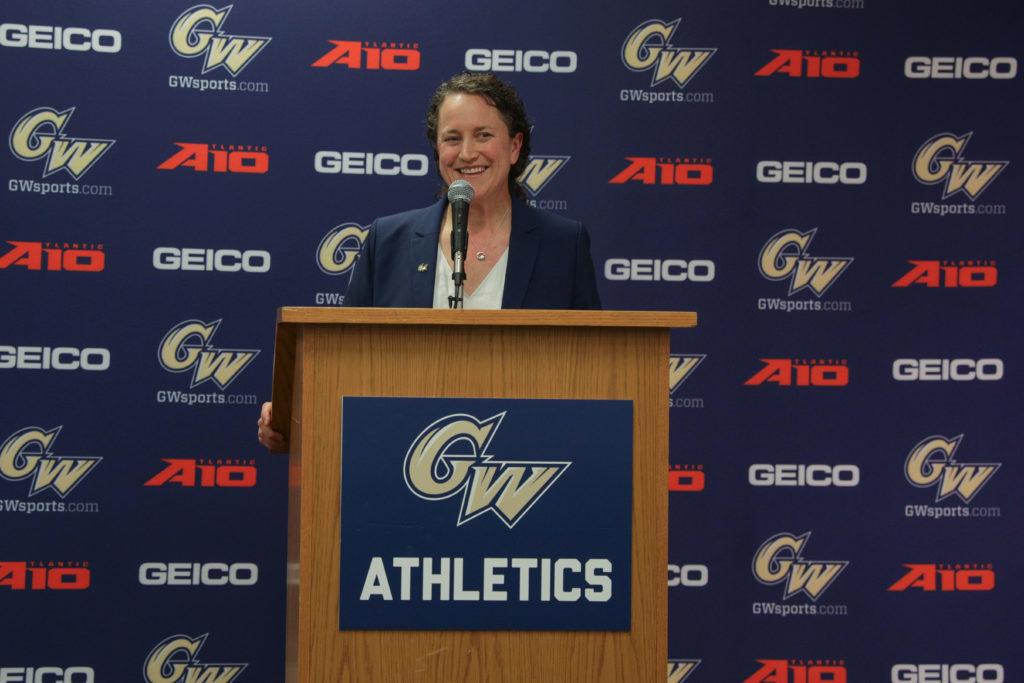Updated: Aug. 26, 2019 at 11:15 a.m.
When athletic director Tanya Vogel took over the department last year, she set her sights on becoming an accessible administrator to student-athletes and coaches.
But Vogel said she lacked the resources to fulfill her first-year promises, grading herself with a “C, C minus” in her first year at the helm. The third athletic director in 25 years, Vogel entered a department hit by allegations of misconduct from the former head.
Heading into year No. 2, Vogel said she developed a system to meet her initial goal – including scheduling meetings with coaches and regular office hours – and mapped out new initiatives, like a Smith Center revamp. She said forming relationships is the foundation for “everything,” especially for boosting enthusiasm from the 27 teams she oversees.
“We should all want to do that to the best of our ability to make GW better, and my hope is that our department embodies that,” Vogel said.
Strengthening relationships
Vogel said that while the task may seem “silly,” she wants to learn and remember the name of every member of the athletic department. She said she cannot build a strong relationship without knowing someone’s name.
“It’s going to take a little bit of time,” Vogel said. “I do think it’s at the root of building relationships and everything that we do in higher ed, but definitely athletics is geared and kind of grounded in relationships.”
She said she spent the spring and summer months regrouping and devising a tangible plan to be more accessible to students and coaches. Vogel said she organized regular office hours and plans to meet with every head coach three times per year – once in the preseason, once in the postseason and once out of season.
Twenty head coaches head GW’s 27 varsity programs, with three being responsible for 10 teams. Anderson Good coaches men’s and women’s squash, and Barry King leads the men’s and women’s water polo squads. Terry Weir coaches six programs, including men’s and women’s cross country, indoor track and field, and outdoor track and field.
“Every preseason meeting is also a postseason, an offseason meeting, so it gets a little nuanced with sports that go year-round,” Vogel said.
Preseason meetings consist of program-wide goal setting and talks about team personnel and the squads’ schedules, she said. Vogel said she wants coaches to review the season and evaluate their success in competition in postseason, while offseason meetings are used to draft long-term goals and foster professional development.
“We hire head coaches to be really narrowly focused on their program, but offseason meetings give them a chance to pan backwards a little bit and have a little bit more perspective, and talk a little bit more about future planning and preparation,” she said.
Vogel will also work more closely with sports administrators, who act as “an advocate and resource” for student-athletes and coaches, to attend practices and games.
“I now have a systematic approach to it, so every single month I would make sure I’m out at practices with the sports administrator, who is positioned to best support those students and coaches,” she said.
Revamping the Smith Center
Athletic department officials announced an updated court design and a new scoreboard in July for the upcoming 2019-20 season as part of a series of upgrades to the Smith Center that will roll out in the coming months.
Vogel said her desire for the Smith Center to be a community epicenter and landmark on campus inspired the upgrades. She said she wants to pack crowds into the building and host local high schools and Foggy Bottom residents for events and games.
Kevin Days, the director of community relations, introduced transferring the University’s liquor license from the Marvin Center to the Smith Center in April, and Vogel proposed at a Foggy Bottom neighborhood meeting in July. GW, along with St. Bonaventure, La Salle and Fordham, are the only Atlantic 10 schools that do not sell alcohol at sporting events.
“We want to be a center where people, students, faculty, staff, alum, Foggy Bottom residents, come together and celebrate,” she said.
Vogel added that students can expect one update to the center’s exterior. She declined to name the change, saying details will be unveiled throughout the course of the academic year.
She said the full renovations are set to be completed prior to men’s and women’s basketball’s opening day. The men’s squad is to embark on its first nonconference game of the season Nov. 9 against Howard. The women follow closely behind, opening their regular season Nov. 10 against Princeton.
Athletic department officials enlisted Populous, a Kansas City, Mo.-based architecture firm, to take on the changes, she said. Vogel declined to state the total cost of the changes but said GW is receiving funding from philanthropy and corporate partners.
“We want to, as staff members here, be changing the world through all of our students, all of our faculty and all of our staff, one life at a time,” Vogel said. “So my hope is that the department under my leadership exemplifies that.”
Belle Long contributed reporting.
This post was updated to clarify the following:
In the original version of the story, The Hatchet reported that Kevin Days proposed transferring GW’s liquor license to Smith Center. Days introduced the topic, and Vogel proposed the change in July.





